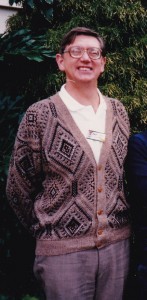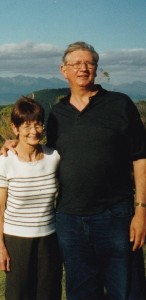Otto Muller – A Short Tribute
by his son, Frank Müller
4 October 2014

Frank Otto Muller was born on 18 June 1938 in Matatiele in the Eastern Cape – an unremarkable start to a remarkable life.
Otto would have made a great engineer, had he not studied medicine. He was incurably curious about absolutely everything. From my childhood, I vividly remember Otto always repairing things – toilets, toys, cars, houses… You name it. As soon as I was old enough, he taught me what he knew about plumbing (which was quite a lot). And, like the great teacher he was, he delegated once the lesson was over. I became the plumber of first recourse, only calling him when I got stuck.
At age 18, Otto had to be confirmed as a communicant member of the church. The night before his confirmation, the dominee asked Otto if he was a Christian. Otto’s honest answer was, “No!” The shocked dominee nevertheless forced Otto to go through the confirmation ceremony for the sake of decorum. This episode left a lasting scar in Otto’s life. With his sense of integrity thus violated, he became an outspoken atheist, deeply suspicious of all religion, ritualism and formalism. He could not stand façades or hidden agendas.
One grimy morning on Germiston station, changing trains en route back to a new term of medical school, something unexpected happened. In front of him, a young woman carried a heavy suitcase held together by a belt. Suddenly, the belt broke and the contents spilled among the teeming masses. Otto immediately stopped to help her gather her belongings. Surprisingly, she was also a medical student at Tuks. Although no romance developed at that stage, this first meeting with Gundel would eventually turn his life upside down.
 Otto and Gundel fell deeply in love and wanted to marry. Gundel’s father having died in the war, Otto asked Gundel’s mother Mareile for the hand of her daughter. Mareile’s response was the same as the question the dominee had asked: “Are you a Christian?” Again the honest answer came: “No!” But now, instead of a façade, he encountered rock solid steel. In his words, Mareile threw him out the front door and shut it behind him. Then, as an afterthought, the door opened and she threw a book at him. “Read this!” was the command before the door was closed and locked again.
Otto and Gundel fell deeply in love and wanted to marry. Gundel’s father having died in the war, Otto asked Gundel’s mother Mareile for the hand of her daughter. Mareile’s response was the same as the question the dominee had asked: “Are you a Christian?” Again the honest answer came: “No!” But now, instead of a façade, he encountered rock solid steel. In his words, Mareile threw him out the front door and shut it behind him. Then, as an afterthought, the door opened and she threw a book at him. “Read this!” was the command before the door was closed and locked again.
And so, at the insistence of an honest German lady and through the writings of a humble Chinese peasant, Otto found Jesus. Or rather, was found repentant by Jesus. The book was called “The Normal Christian Life” and was written by Watchman Nee. The change in Otto’s life was profound. From that point forward, he longed for others to see what he had seen, to experience the joy he had experienced. He became passionately involved in Hatfield Baptist Church, but also in the Christian Medical Fellowship of South Africa. He wanted to become a missionary doctor. But God had other pans.
On December 16, 1963, Otto and Gundel were married. A year later, in 1965, they moved to Germany where Otto had won a scholarship in Pharmacology. Returning to South Africa, Otto became a lecturer in Pharmacology at the University of Pretoria. Not long afterwards, he was asked by Prof Francois Retief to head up the Department of Pharmacology at the newly established medical school in Bloemfontein. At age 33, he became one of the youngest professors in South Africa.
Otto, the builder, kept building. He expanded his department into a world-class toxicology laboratory. He founded and built the Hoechst and FARMOVS Research Institutes. He served on numerous committees in the medical and pharmaceutical field, leading from the front in many cases. Under his enthusiastic presidency, the Christian Medical Fellowship grew to more than 800 members, its largest size ever. Some 3,000 medical students passed through its hands.
On December 16, 2013, we celebrated Otto and Gundel’s Golden Jubilee. The formidable team had worked together for the good of others for fifty years and showed no sign of slowing down. Otto was fully engaged with building a house for his daughter Muchi and planning to build a church in Thembalethu. In May, after his unexpected hip fracture, he had to slow down physically, but his mind and heart seemed to accelerate. He must have sensed that the end was near, even though his hip was healing well. When the end finally came, it arrived like a hurricane, but left five weeks later as a calm and gentle breeze. At midnight on 28 September 2014, Frank Otto Müller at last saw his beloved Redeemer face to face, confident of his share in the resurrection.




